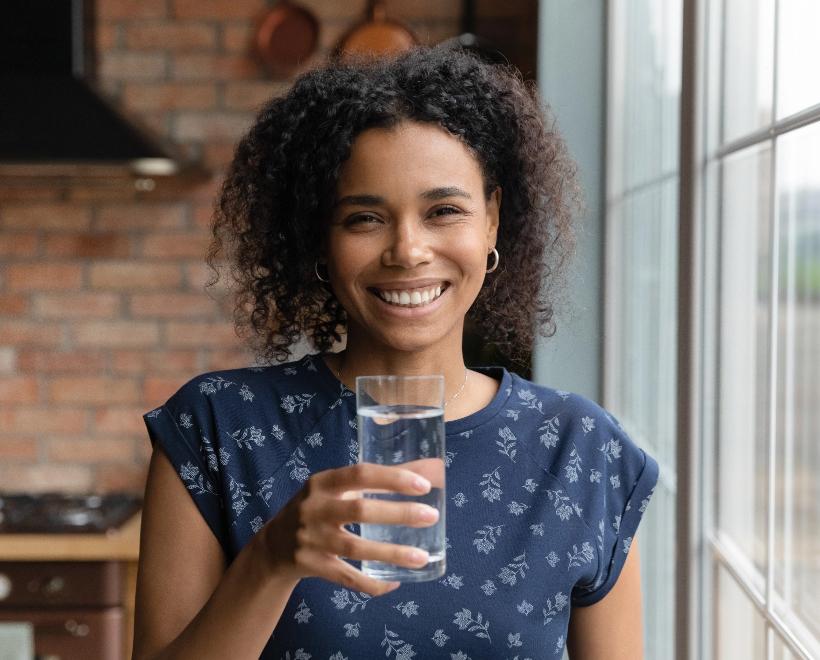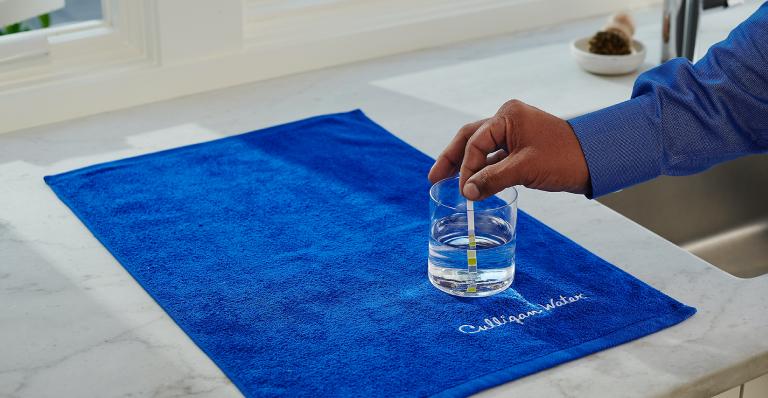Reverse osmosis drinking water systems near Brooklyn Park, MN
No one filters more than Culligan water
View Products

Ditch the pitcher and forget the fridge filter
Culligan Reverse Osmosis Drinking Water Systems are customizable, with 12 interchangeable filters. They are certified to reduce up to 60 water contaminants found in Brooklyn Park, MN.

How a reverse osmosis drinking water system works
There are four distinct steps in reverse osmosis water filtration - pre-filtration, reverse osmosis, drainage and storage.
Multi-stage filtration for better water
- Sediment filter traps rust, sand and other large particles
- Carbon filter tackles bad tastes and odors, like chlorine
- Reverse osmosis filter reduces contaminants like lead, mercury, chromium and more
- Advanced specialty filters reduce pharmaceuticals, virus, bacteria and more
- Custom filters add minerals back in and increase the water’s PH
- Polishing filter makes water crisp and results in a better taste
A Culligan Reverse Osmosis Drinking Water System gives you
Get clearer water — starting with a few quick questions.
Answer a short quiz to uncover what’s going on with your water. Then see custom system recommendations tailored to your needs. Want a pro’s opinion? Schedule a free consultation with your local Culligan expert.
Take the Quiz1
Tell us about your water
2
Get personalized recommendations
3
Book a free water test & consultation
These drinking water systems can help solve Brooklyn Park, MN water problems such as
The Culligan advantage
Don't miss out on local deals
Special offer
Best Bottleless Cooler*
Give your people Culligan Water with a Bottleless Cooler for $59 per month.
*Limited time offer. See dealer for details. Rental price subject to 12 month term agreement. Only one coupon per person and not valid with other offers. Dealer participation may vary.
Special offer
Try FREE for 7 days!*
Try a bottleless cooler absolutely FREE for 7 days.
*Limited time offer. Dealer participation varies. See dealer for details. Contaminants may not be in your water.
Worried about your water?
Get a FREE water consultation!
Improving your home's water is easier and more convenient than ever with Culligan's in-home or virtual appointments.
Schedule Your Water Test

Frequently asked questions
Reverse osmosis is a process that reduces contaminants, solid substances, large molecules and minerals from water by using pressure to push it through specialized membranes. It is a purification method used to improve water for drinking, cooking and other household uses.
The key to understanding reverse osmosis is first understanding the process of osmosis. Osmosis is defined as the passage of a solvent, such as water, from a lower-concentration solution to a higher-concentration solution. A semipermeable membrane separating the two solutions allows the solvent to pass. But not what is dissolved in it. The flow finally stops when both solutions become equal in concentration. This process is classified as passive transport, because it does not require energy to be applied.
Unlike osmosis, reverse osmosis requires an external force to complete the transport. Therefore, pressure is a key part of the reverse osmosis process. And as its name implies, reverse osmosis is the opposite of osmosis. Instead of balancing out the two solutions, the external force of pressure reverses the natural flow.
The key to understanding reverse osmosis is first understanding the process of osmosis. Osmosis is defined as the passage of a solvent, such as water, from a lower-concentration solution to a higher-concentration solution. A semipermeable membrane separating the two solutions allows the solvent to pass. But not what is dissolved in it. The flow finally stops when both solutions become equal in concentration. This process is classified as passive transport, because it does not require energy to be applied.
Unlike osmosis, reverse osmosis requires an external force to complete the transport. Therefore, pressure is a key part of the reverse osmosis process. And as its name implies, reverse osmosis is the opposite of osmosis. Instead of balancing out the two solutions, the external force of pressure reverses the natural flow.
Your home might rely on water treatment methods such as refrigerator filters, pitcher filters or faucet filters. While these options are effective at improving taste and reducing sediment or other particles found in drinking water, they don't address dissolved solids, arsenic, viruses and bacteria. Reverse osmosis, on the other hand, is a type of water filtration that can reduce up to 99% of contaminants found in drinking water, including larger particles and those that you can't always see, taste or smell.
A reverse osmosis drinking water system reduces a wide variety of contaminants that may be found in water in Brooklyn Park, MN, including:
- Lead
- Mercury
- Chromium
- Chloride
- Copper
- Arsenic
- Fluoride
- Radium
- Nitrate
- TDS (Total Dissolved Solids)
- Bacteria such as Salmonella, Shigella, E. coli
- Protozoa, like Cryptosporidium and Giardia
- Viruses such as Hepatitis A, Norovirus, Rotavirus
Yes, reverse osmosis water is a safe drinking water option for your household. The Water Quality Association has concluded that water treated with a reverse osmosis drinking water system does not pose any health concerns for healthy individuals. Consuming reverse osmosis water can help minimize health risks associated with potentially harmful substances that are sometimes found in drinking water.
Reverse osmosis is a water treatment process that reduces contaminants from water by using pressure to force the water molecules through a semipermeable membrane.
Distilled water is water that has been treated by passing through one or more evaporation-condensation cycles until it contains a very low amount of dissolved solids (usually less than 5.0 ppm TDS).
Distilled and reverse osmosis water are both commercially available, but reverse osmosis is more commonly used in home treatment systems. While some households opt to install a home distillation solution, these systems tend to be less convenient, and they usually require more energy and owner involvement to run.
Distilled water is water that has been treated by passing through one or more evaporation-condensation cycles until it contains a very low amount of dissolved solids (usually less than 5.0 ppm TDS).
Distilled and reverse osmosis water are both commercially available, but reverse osmosis is more commonly used in home treatment systems. While some households opt to install a home distillation solution, these systems tend to be less convenient, and they usually require more energy and owner involvement to run.
Yes, the performance and longevity of your reverse osmosis system will be impacted by regular maintenance. However, top-performing reverse osmosis filtration systems tend to require little ongoing effort.
At a minimum, you should plan to change your filters every 1-2 years. You should also make sure your reverse osmosis drinking water system is sanitized once a year.
Selecting your reverse osmosis system from an industry-leading manufacturer and service partner will ensure that your system runs efficiently. Your local Culligan water experts are equipped to handle every aspect of maintenance and ongoing care. From installation to filter changes and sanitization appointments, Culligan ensures that all parts continue working properly so you can provide your household with safer, better-tasting water.
At a minimum, you should plan to change your filters every 1-2 years. You should also make sure your reverse osmosis drinking water system is sanitized once a year.
Selecting your reverse osmosis system from an industry-leading manufacturer and service partner will ensure that your system runs efficiently. Your local Culligan water experts are equipped to handle every aspect of maintenance and ongoing care. From installation to filter changes and sanitization appointments, Culligan ensures that all parts continue working properly so you can provide your household with safer, better-tasting water.
The Culligan of Minneapolis and Saint Paul difference
Get pricing & special offers
Call 877-984-1822 or fill out the form to get a custom water solution.
Thank you for contacting us.
One of our local water experts will contact you shortly.
We ran into an issue submitting your form, please call
866-330-4482
to connect with your Culligan Dealer.













